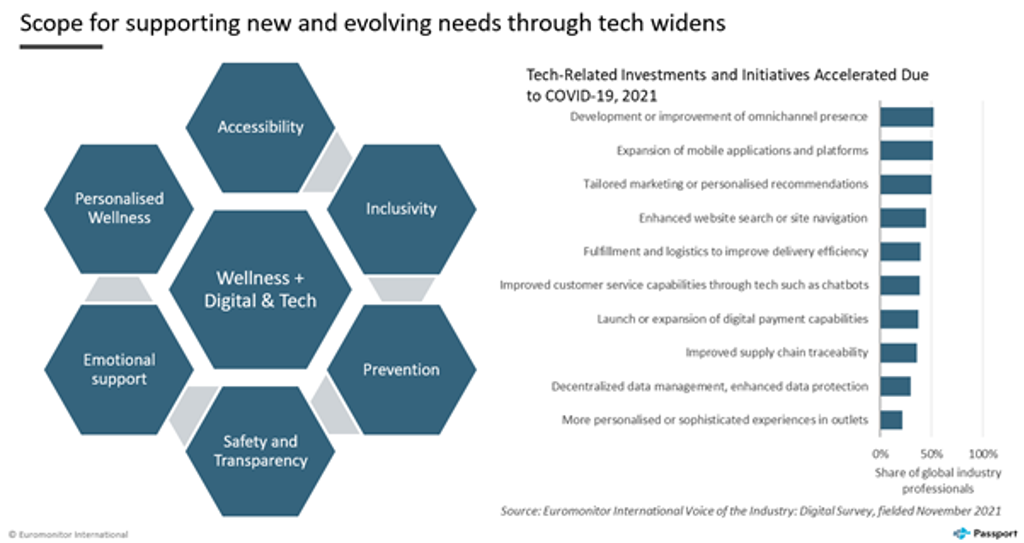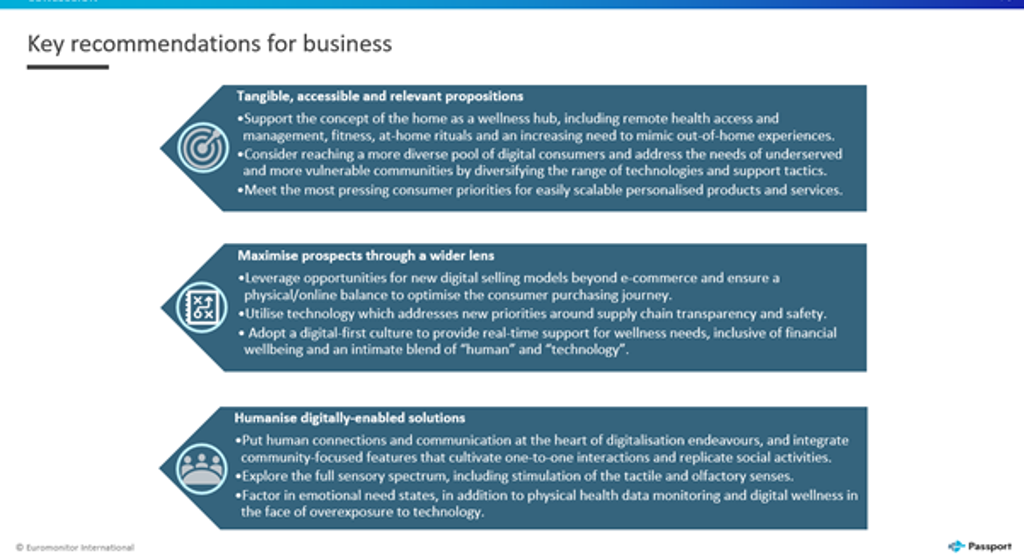The significance of two of the most influential societal and business megatrends today, wellness and digitalisation, was elevated in the face of the pandemic, as they filled a critical void resulting from the crisis-induced health and lifestyle challenges.
The transformative nature of hyper-connectivity and the evolution of technology have created an enormous opportunity space in data-driven self-enhancement and tech-enabled wellness, and improved access to a wide range of health solutions.

Source: Euromonitor International
Personalisation as a core pillar for wellness pursuits
Aside from an inevitable boost in e-commerce and the proliferation of selling channels, utilising digital technologies and tools is facilitating many wellness-related micro trends, such as personalisation, supply chain transparency and emotional wellbeing.
In the context of new health priorities, including safe and transparent ingredient formulations, as well as clinical efficacy backed by science and expertise, the concept of personalisation will pivot towards more focus on education through, for example, blockchain technology for traceability, digitally-enabled ingredient safety verification, at-home and real-time health guidance and support, and tailored results monitoring. Indeed, more than 50% of industry professionals indicate they have accelerated tech investments around personalised recommendations due to the pandemic, according to Euromonitor’s Voice of the Industry: Digital Survey.
In the realm of health and beauty, the rapid evolution of artificial intelligence has allowed the distillation of vast amounts of data in order to provide personalised product and routine recommendations online, while more advanced diagnostic tools are enabling further precision in tailoring to individual skin health needs with unique customised formulations. More notably, there is significant potential for exploring further solutions around women’s health and hormonal personalisation, a largely untapped space, to provide predictive outcomes and symptom management in the areas of reproductive, menopausal and sexual health.
As challenges to scale personalisation concepts and limitations in terms of precision in predictive results and profiling are still widely prevalent, it will be key for businesses to ensure simplicity and affordability in order to democratise access to all. Technology as part of the end product development will be a major component, but service-oriented tailoring, digital curation and predictive experiences will be equally important, if not more necessary, to allow for wider accessibility.
Technology as an enabler of emotional support
The proliferation of wellness data collection enabled through digital technologies will continue to enhance self-care solutions, not just within the scope of physical wellbeing, but increasingly in the realm of emotional health too. Beyond enhancing personal connections and fostering community-building, developments are already venturing into predictive emotional analytics to tailor to mood states, haptic technology to replicate sensorial experiences, and blending neuroscience with digital content for emotional-related product and ingredient benefits.
Leveraging neuroscience capabilities alongside artificial intelligence has been of particular relevance in the area of functional scents and fragrances to aid relaxation or enhance and improve sleep, as exemplified by IFF’s partnership with Sleep Score Labs, which utilises sleep data capture and analysis to deliver validated scent-based solutions for consumers.
Using technology to monitor or manage mental health concerns, such as stress, anxiety and loneliness, has become more mainstream among consumers, with a greater number of respondents across the globe indicating the use of tech devices to mitigate stress levels during the pandemic years, according to Euromonitor’s Voice of the Consumer: Digital Survey.
From a business perspective, Apple has been expanding its focus on mental health since the onset of the pandemic, and it is reportedly developing technology to diagnose depression and cognitive decline using sensor data including physical activity, general mobility, and sleep patterns. These developments come as a progression from a number of emotional tracking devices released in recent years, such as Fitbit’s Charge 5 device, which monitors stress and holistic health via a “Readiness score”, from which users can assess recovery levels and needs.
While digitalisation and technology in the emotional wellbeing context may seem a contradiction in terms, evolving technology such as robotics, computer vision, connected sensors and voice control are enabling emotion recognition and tracking and even ‘human’ connectivity between machines and individuals, thus opening up opportunities for emotional therapy through tech.
Key business recommendations
While the immediate pandemic-related impacts are subsiding, the endurance of a more deeply entrenched penchant for self-care, increased adoption of digital technology and higher expectations of efficacy among consumers will continue to underpin business innovation and strategy at the intersection of wellness and technology in the years to come.

Source: Euromonitor International
Innovation should consider all aspects of wellness, from preventative health and supply chain transparency to emotional support and embracing inclusion and accessibility in the context of wider society, of any income, race or ethnicity, and address structural inequalities to empower all generations.
For further insight view our report, Wellness Redefined: Exploring the Case for Emotional Wellbeing.
